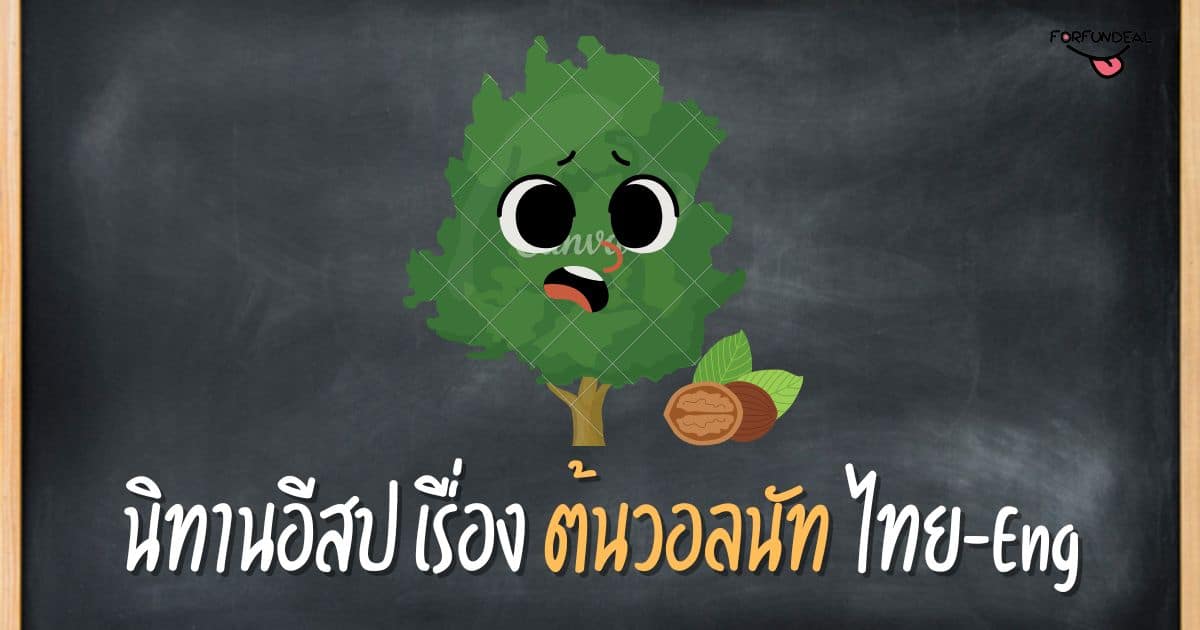“ต้นวอลนัท” เป็นนิทานอีสปที่เล่าถึงต้นวอลนัทที่ออกผลริมถนนถูกผู้คนที่เดินผ่านไปมาแย่งชิงถั่ว ทำให้ต้นไม่พอใจและบอกว่าผู้คนต่างยินดีกับผลอลนัท แต่มีวิธีแสดงความขอบคุณที่แย่มาก
นิทานอีสปเรื่องต้นวอลนัท
กาลครั้งหนึ่งนานมาแล้ว ในชนบทอันเงียบสงบ มีต้นวอลนัทอันงดงามยืนต้นอยู่ ในแต่ละปี จะมีลูกวอลนัทที่ประณีตที่สุด เป็นที่ชื่นใจอย่างแท้จริงแก่ทุกคนที่ผ่านไปมา แต่ต้นไม้กลับเก็บงำความไม่พอใจที่เพิ่มมากขึ้น ผู้ที่สัญจรไปมามีวิธีเพลิดเพลินกับผลไม้ที่แปลกประหลาด แทนที่จะค่อยๆ เก็บวอลนัท พวกเขากลับขว้างกิ่งไม้และก้อนหิน ทำให้ถั่วอันล้ำค่าตกลงมา
Once upon a time, In a peaceful countryside, there stood a magnificent walnut tree. Each year, it bore the most exquisite walnuts, a true delight for all who passed by. Yet, the tree harbored a growing discontent. The passersby had a peculiar way of enjoying its fruits; instead of gently picking the walnuts, they hurled sticks and stones, causing the prized nuts to rain down.
วันหนึ่ง ขณะที่แสงแดดอาบต้นไม้ด้วยอ้อมกอดอันอบอุ่น ต้นวอลนัทก็ไม่สามารถระงับความคับข้องใจได้อีกต่อไป ต้นวอลนัทส่งเสียงกรอบแกรบและถอนหายใจยาวว่า “ผู้คนยินดีกับผลไม้ของข้า แต่พวกเขามีวิธีแสดงความขอบคุณที่แย่มาก พวกเขาขว้างไม้และก้อนหินโดยไม่ได้ตระหนักถึงความเจ็บปวดที่ทำให้เกิดกับข้า”
One day, as the sun bathed the walnut tree in a warm embrace, it could no longer contain its frustration. With a rustling of leaves and a deep sigh, the walnut tree complained, “People gladly enjoy my fruits, but they have a terrible way of showing their gratitude. They throw sticks and stones, not realizing the pain they inflict upon me.”
เมื่อได้ยินเสียงคร่ำครวญของต้นไม้ นักเดินทางเฒ่าเดินผ่านก็หยุดชะงักไป เขาเงยหน้าขึ้นมองต้นไม้แล้วพูดว่า “ต้นวอลนัทที่รัก ข้าเข้าใจความหงุดหงิดของเจ้า ผู้คนมักไม่ตระหนักถึงอันตรายที่พวกเขาก่อขึ้นในขณะที่เก็บเกี่ยวผลประโยชน์จากเจ้า แต่จำไว้ว่าไม่ใช่ทุกคนจะเหมือนกัน มีคนที่ชื่นชมของขวัญของเจ้า และจะปฏิบัติต่อคุณด้วยความกรุณา”
Hearing the tree’s lament, an old traveler passing by paused. He looked up at the tree and said, “Dear walnut tree, I understand your frustration. People often don’t realize the harm they cause while reaping the benefits. But remember, not everyone is the same. There are those who appreciate your gifts and will treat you with kindness.”
ต้นวอลนัทไตร่ตรองคำพูดเหล่านี้ขณะที่นักเดินทางเดินทางต่อไป เมื่อฤดูกาลเปลี่ยนไป ผู้คนที่สัญจรไปมาบางคนยังคงใช้เส้นทางที่ยากลำบาก แต่คนอื่นๆ เริ่มสังเกตเห็นความไม่สบายของต้นไม้ พวกเขาเริ่มเก็บวอลนัทอย่างนุ่มนวล แสดงความขอบคุณอย่างมีวิจารณญาณมากขึ้น
The walnut tree pondered these words as the traveler continued on his journey. As the seasons changed, some passersby continued their rough ways, but others began to notice the tree’s discomfort. They started to pick walnuts gently, expressing their gratitude in a more thoughtful manner.

นิทานเรื่องนี้สอนให้รู้ว่า
“การกระทำอาจส่งผลต่อผู้อื่นแม้จะไม่ได้ตั้งใจก็ตาม และไม่ใช่ทุกคนจะปฏิตนดีกับคุณเสมอ”
- ความกตัญญูกตเวทีและความเคารพ: เรื่องราวนี้เน้นถึงความสำคัญของการแสดงความกตัญญูและความเคารพต่อของขวัญจากธรรมชาติและความพยายามของผู้อื่น การได้รับสิทธิประโยชน์เป็นเพียงส่วนหนึ่งของสมการเท่านั้น วิธีที่เราปฏิบัติต่อแหล่งที่มามีความสำคัญ
- การเปลี่ยนแปลงเริ่มต้นด้วยการตระหนักรู้: บางครั้งผู้คนต้องการสิ่งเตือนใจหรือสะกิดเบาๆ เพื่อเปลี่ยนพฤติกรรมของตน การตระหนักรู้สามารถนำไปสู่การกระทำที่คำนึงถึงผู้อื่นมากขึ้น
- ไม่ใช่ทุกคนที่เหมือนกัน: นิทานเตือนเราว่าผู้คนมีมุมมองและพฤติกรรมที่แตกต่างกัน แม้ว่าบางคนอาจทำโดยไม่คิดอะไร แต่บางคนก็มีน้ำใจและใจดี สิ่งสำคัญคือต้องไม่สรุปและชื่นชมความหลากหลายในพฤติกรรมของมนุษย์
- พระคำแห่งปัญญา: คำแนะนำของนักเดินทางเน้นย้ำถึงพลังแห่งปัญญาและอิทธิพลเชิงบวกที่มีต่อการเปลี่ยนแปลงทัศนคติและการกระทำ
- ความอดทนของต้นไม้: ความอดทนของต้นวอลนัทในการหวังการเปลี่ยนแปลงแสดงให้เห็นถึงความยืดหยุ่นและความเชื่อในความดีของธรรมชาติของมนุษย์
“Actions can affect others, even unintentionally. And not everyone will always treat you well.”
- Gratitude and Respect: This story highlights the importance of showing gratitude and respect for the gifts of nature and the efforts of others. Enjoying benefits is only part of the equation; how we treat the source matters.
- Change Begins with Awareness: Sometimes, people need a reminder or a gentle nudge to change their behavior. Awareness can lead to more considerate actions.
- Not Everyone is Alike: The tale reminds us that people have different perspectives and behaviors. While some may act without thinking, others are considerate and kind. It’s essential not to generalize and appreciate the diversity in human behavior.
- Words of Wisdom: The traveler’s advice emphasizes the power of wisdom and the positive influence it can have on changing attitudes and actions.
- The Walnut Tree’s Patience: The walnut tree’s patience in hoping for change demonstrates resilience and the belief in the goodness of human nature.
โดยสรุปแล้วนิทานเรื่องนี้สนับสนุนให้เราคำนึงถึงวิธีที่เราเพลิดเพลินกับของขวัญจากธรรมชาติและการมีส่วนร่วมของผู้อื่น มันทำหน้าที่เป็นเครื่องเตือนใจว่าการกระทำของเราสามารถส่งผลกระทบต่อโลกรอบตัวเราได้ และความมีน้ำใจเล็กๆ น้อยๆ จะช่วยแสดงความขอบคุณได้เป็นอย่างดี

